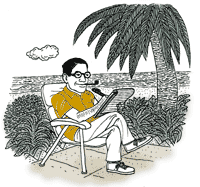 The show, at Echo Park's Taix, was full of so much energy and musical invention (Guided by Voices' guitarist Doug Gillard was especially inspired that night) it made The Misread City crave a document of this quartet's triumph. (Here for my earlier post on Bambi Kino and its mission.)
The show, at Echo Park's Taix, was full of so much energy and musical invention (Guided by Voices' guitarist Doug Gillard was especially inspired that night) it made The Misread City crave a document of this quartet's triumph. (Here for my earlier post on Bambi Kino and its mission.)So I'm happy to report that this group -- made up of members of Catpower, GbV, Nada Surf and Maplewood -- has just released an album, recorded at Hamburg's Indra Club, that captures the spirit of its shows quite well. It's made up, of course, of the music the Beatles were playing in 1960 and '61 -- Chuck Berry's "Talking About You," Buddy Holly's "Crying Waiting Hoping," Johnny Kidd's "Shakin' All Over" -- played with the roughness and speed of the leather-jacketed Liverpudlians.
Rhythm guitartist/singer Mark Rozzo, a longtime friend of The Misread City, recently chronicled Hamburg's current scene for the New York Times magazine. Rozzo laughs at the irony of his band -- which sometimes plays as much as 60 songs a night and put on a marathon show at Taix -- putting out a succinct, 12-song LP.
"We didn't want to do any song that ever appeared on a Beatles studio album and we wanted to include a couple of numbers the Beatles were known to have performed but never recorded at all. Meaning, they were never used for auditions or BBC radio shows or were never bootlegged. Those would be 'Wild Cat,' by Gene Vincent, 'Ramrod,' a Duane Eddy instrumental they apparently used when they backed strippers, and 'Shakin' All Over,' by Johnny Kidd and the Pirates, a big hit in the UK in 1960 that also happened to be Pete Best's audition number. They were almost certainly playing all of those numbers at the Indra Club in 1960. We also wanted to make sure everyone had a chance to sing a couple of numbers.
He calls the songs "all insanely fun" to play live.
"Specifically of the 12 on the album, I'd have to nominated 'Some Other Guy,' because it's our traditional lead-off number and just says so much about Bambi Kino as well as what the Beatles were about in the early days. 'Besame Mucho' is a riot to play; so much going on and it's all so goofy and it also totally rocks. Erik just nails the singing on that one. Maybe 'Ramrod,' because it's such a stomping instrumental and Doug does something amazing on it every time we play it. 'Shot of Rhythm and Blues' I like because that's one number where you see every single person in the club kind bobbing up and down, rocking out."
(Here they are, by the way, playing "Slow Down," a song not on the album.)
(Here they are, by the way, playing "Slow Down," a song not on the album.)
What's the future of Bambi Kino, Mark?
"The future is the past!" he says. "Let's see... we've got a residency lined up at Bowery Electric in New York for April and then a probable return to Hamburg at some point in 2011. There are more 50th anniversaries on the way, of course. One thing: I don't ever see us putting on suits and wigs and Beatle boots. But we'd like to keep this going for a couple of years and try to learn another 100 songs or so. "

















